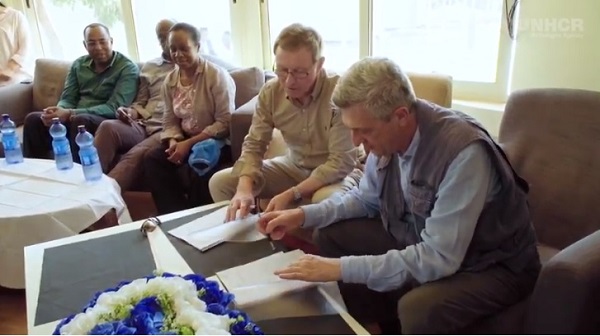
“What has developed here is a unique approach to self-reliance of refugees where the government of Ethiopia has been extremely open to new approaches,” said Filippo Grandi.
By Dana Hughes (UNHCR) |
ADDIS ABABA – On his four-day visit to Ethiopia, UN High Commissioner for Refugees (UNHCR) Filippo Grandi praised the country’s generosity towards hosting refugees, as well as the government’s openness to new and innovative approaches to improve the lives of the more than 900,000 refugees and the communities hosting them.
The High Commissioner spent two days in Melkadida, a region bordering Somalia, which hosts over 200,000 refugees. He saw first hand how a US$100 million investment by the IKEA Foundation over the last seven years has transformed the semi-arid, isolated area into a thriving community.
———————————————-
———————————————-
Filippo Grandi visited projects funded by the Foundation, including an irrigation scheme where 1,000 hectares of previously barren land are now lush farms that enable refugees grow crops such as watermelon, tomatoes and corn up to three times a year.
He also visited markets supported by microfinance and other economic empowerment programs, where refugees and the local community buy and sell their crops. The program has been so successful that some of the crops are being exported to other regions in the country. Refugees told the High Commissioner that they are saving some of their income to improve the markets themselves.
“What has developed here is a unique approach to self-reliance of refugees where the government of Ethiopia has been extremely open to new approaches,” said Grandi. “The host communities and refugees have also been remarkably open to work together in harmony. This is something we don’t normally see.”
At a meeting with community leaders in Dollo Ado, the High Commissioner and IKEA Foundation CEO Per Heggenes heard about how the investment has had a positive impact on the entire community. They also announced that the Foundation has decided to extend their investment in the project for at least three more years to ensure the community can sustain it independently.
Heggenes, who noted that the area was in a dire situation when the project began, calls the progress he has witnessed “a dream come true.” He said its legacy is as much about helping foster harmony between the refugees and the local Ethiopians, as it is about growing the economy.
Continue reading this story at UNHCR
